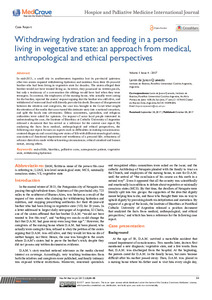Por favor, use este identificador para citar o enlazar este ítem:
https://repositorio.uca.edu.ar/handle/123456789/1513| Campo DC | Valor | Lengua/Idioma |
|---|---|---|
| dc.contributor.author | De Janon Quevedo, Lenin | es |
| dc.date.accessioned | 2019-05-02T13:58:07Z | - |
| dc.date.available | 2019-05-02T13:58:07Z | - |
| dc.date.issued | 2017 | - |
| dc.identifier.citation | De Janon Quevedo, Lenin. (2017). Withdrawing hydration and feeding in a person living in vegetative state : an approach from medical, anthropological and ethical perspectives. [en línea]. Hospice and palliative medicine international journal 1(4). Disponible en: https://repositorio.uca.edu.ar/handle/123456789/1513 | es |
| dc.identifier.issn | 2576-4497 | - |
| dc.identifier.uri | https://repositorio.uca.edu.ar/handle/123456789/1513 | - |
| dc.description.abstract | Abstract: In mid-2013, a small city in southwestern Argentina lost its provincial quietness after two sisters required withdrawing hydration and nutrition from their 49-year-old brother who had been living in vegetative state for decades. The sisters alleged their brother would not have wanted living so; however, they possessed no written proofs, but only a testimony of a conversation the siblings would have had when they were teenagers. In contrast, the employees of the nursing home, who actually were caring for the brother, rejected the sisters’ request arguing that the brother was still alive, and withdrawal of water and food will directly provoke his death. Because of disagreement between the relatives and caregivers, the case was brought to the Court what caught the attention of the media that soon turned this intimate story into a national sensation, and split the locals into adversaries. Ethics committees, specialists, and religious authorities were asked for opinions. On request of some local people interested in understanding the case, the Institute of Bioethics at Catholic University of Argentina released a document that has served as a reference for the current case report. By analyzing the facts from medical, anthropological and ethical perspectives, the following case report focuses on aspects such as difficulties in making consciousness-centered diagnosis and conceiving new states of life with different neurological status; association of functional impairment and worthiness of a personal life; robustness of advance directives made without knowing circumstances; ethical standard and human nature, among others | es |
| dc.format | application/pdf | es |
| dc.language | spa | es |
| dc.language.iso | eng | es |
| dc.publisher | MedCrave | es |
| dc.rights | Acceso Abierto | es |
| dc.rights.uri | https://creativecommons.org/licenses/by-nc-sa/4.0/ | es |
| dc.source | Hospice and Palliative Medicine International Journal, 1(4), 2017 | es |
| dc.source | ISSN 2576-4497 | es |
| dc.subject | BIOETICA | es |
| dc.subject | CUIDADOS PALIATIVOS | es |
| dc.subject | MUERTE | es |
| dc.subject | PACIENTES TERMINALES | es |
| dc.subject | HIDRATACION | es |
| dc.subject | ESTADO VEGETATIVO | es |
| dc.subject | NUTRICION | es |
| dc.title | Withdrawing hydration and feeding in a person living in vegetative state : an approach from medical anthropological and ethical perspectives | es |
| dc.type | Artículo | es |
| uca.path | Facultad de Ciencias Médicas|Instituto de Bioética|Artículos | es |
| uca.disciplina | BIOETICA | es |
| uca.filename | /home/data-uca-generic/folder_generic/withdrawing-hydration-feeding/metadata.xml | es |
| uca.issnrd | 1 | es |
| uca.affiliation | Fil: De Janon Quevedo, Lenin. Universidad Católica Argentina. Instituto de Bioética | es |
| uca.affiliation | Fil: De Janon Quevedo, Lenin. Universidad Rusa de la Amistad de los Pueblos; Rusia | es |
| uca.version | publishedVersion | es |
| item.languageiso639-1 | en | - |
| item.fulltext | With Fulltext | - |
| item.grantfulltext | open | - |
| crisitem.author.dept | Instituto de Bioética | - |
| crisitem.author.orcid | 0000-0002-8983-3812 | - |
| crisitem.author.parentorg | Facultad de Ciencias Médicas | - |
| Aparece en las colecciones: | Artículos | |
Ficheros en este ítem:
| Fichero | Descripción | Tamaño | Formato | |
|---|---|---|---|---|
| HPMIJ-01-00021.pdf | 500,34 kB | Adobe PDF |  Visualizar/Abrir |
Visualizaciones de página(s)
201
comprobado en 30-abr-2024
Descarga(s)
207
comprobado en 30-abr-2024
Google ScholarTM
Ver en Google Scholar
Este ítem está sujeto a una Licencia Creative Commons

